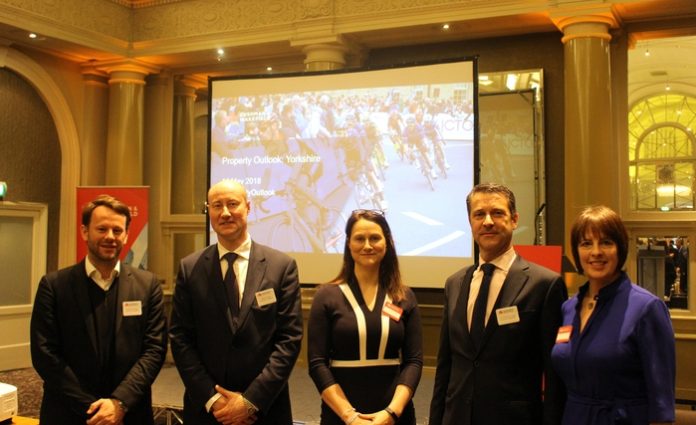
Cushman & Wakefield has presented its Yorkshire Property Outlook for 2018 and beyond. The breakfast presentation, held at The Met Hotel in Leeds city centre, revealed that the property market faces unprecedented threats and opportunities in the coming decade.
Tim Cameron-Jones, Head of Cushman & Wakefield North was joined by Darren Yates, Head of Retail Research & Insight and Richard Pickering, Head of Futures Strategy at Cushman & Wakefield to discuss market conditions and the opportunities and threats that lie ahead. Their presentations were followed by a discussion on how to deliver development and regeneration in uncertain times by Angela Barnicle at Leeds City Council and Vivienne Clements at Henry Boot.
Darren Yates began the event with a presentation which set the scene and discussed key trends in the commercial property market across the main sectors.
Economic and political uncertainty over the last year have made business planning extremely difficult, particularly for sectors like banking, the car industry and agriculture. However, last year also saw the second highest volume on record for commercial property investment with around £60billion worth of deals, driven largely by the industrial sector.
Darren Yates said: “We are seeing a longer term trend which is the growth in industrial, leisure, alternatives and mixed-use, largely at the expense of retail. We’re also seeing an increasing shift towards mixed-use and a blurring of the traditional sectors.
“A more recent trend has been the slowdown in the shopping centre investment market, which reflects investor concerns around the structural changes going on in retail, particularly the secondary market.”
Richard Pickering, Cushman & Wakefield’s Head of Futures Strategy discussed future trends and the impact of digital disruption on the real estate industry.
He said: “There is significant change on the horizon for our industry, led by a shift to a digital economy, plummeting costs of technology and the emergence of new business models.”
Richard’s long-range predictions included: the use of shops changing into a marketing rather than sales function, the re-onshoring of elements of manufacturing as the use of robotics becomes more prevalent, the reinvention and unbundling of housing elements to match new living trends and an expansion of the size of our city ecosystem, driven by transport innovations and virtual working.
Richard said: “Developers, investors and policy makers should plan for the impact of digital disruption in the same way as they plan for competition and near term market movements. With change there are always going to be winners and losers and the greater spread of potential outcomes provides opportunity for those willing to be proactive about the change ahead.”
Angela Barnicle, Chief Officer Asset Management and Regeneration at Leeds City Council and Vivienne Clements, Director at Henry Boot Developments Ltd the discussed the challenges of delivering development and regeneration in uncertain times.
Angela Barnicle said: “As a city we have witnessed significant development over the past decade which has been achieved through working in partnership with the real estate sector. It is only this partnership approach which will allow us to achieve our potential as a city as we collectively identify and embrace the market disruptors in achieving inclusive growth in the next decade.”
Vivienne Clements said: “Developers are experienced in dealing with uncertainty in the UK property market. This being said, the current challenges, particularly Brexit and the impact of escalating digital disruption, will require a whole new approach and great flexibility to secure delivery and value over the longer term.”
Tim Cameron-Jones added: “Yorkshire Outlook is Cushman & Wakefield’s flagship client event for the region. During unprecedented changes for the real estate sector, our event provides a reflection on those changes and the impact on our markets, both now and in the future, including: the evolution of technology; the rise of the industrial and logistics sector; the stability of offices; the challenges facing retail and; the growth of alternatives into a fully recognised asset class.
“Our guest speakers have kindly shared with the audience the opportunities and challenges facing developers and local authorities in delivering new development and the conundrum of development viability in a market where investors, occupiers and their agents are all claiming a shortage of stock.”


















